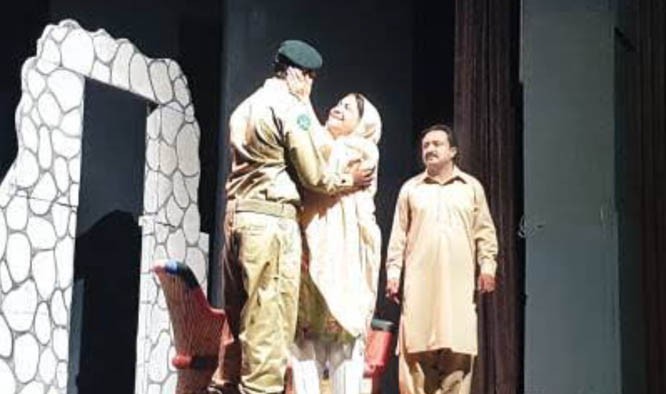
A recent play staged at Lahore’s Alhamra theatre failed to do justice to the many shades of art

As one feared, the play Sipahi Maqbool Hussain had all the flaws that a propaganda act done shoddily is supposed to suffer from.
It has generally been assumed that in societies like Pakistan, visual arts are more valuable or believable than the written word. People here are mostly illiterate, so the way out has been to show films and plays that inculcate a certain set of values.
There were no two views about what the play was meant to be because, even before the action started, there were a number of speeches that pointed to the significance of the theme of the play and the characters, particularly its protagonist in making great sacrifices for the country. The audiences were exhorted repeatedly to follow the example of the protagonist who had spent a lifetime in the enemy prison without flinching and breaking down in the line of duty.
The prelude to the play was a kind of a tableaux in which a number of men and women were seen dancing. Probably it was a recreation of the sword dance, so very characteristic of the desert Arabs. Men were seen flourishing their swords in an effort at choreography to piped music numbers of famous songs including a rendition of Faiz Ahmed Faiz’s "Hum Dekhain Ge" by Iqbal Bano and Noor Jahan’s Sufi Tabbasum-written "Ae Putar Hataan Te Naee Vikday" played in the background. During the entire duration of the play such numbers were played in the background to remind the audience time and again of what it was all about, lest they forgot even for a single moment. The first scene was also an act of unabashed patriotism with the character, probably in the office of a military personnel, down on his knees and kissing the Pakistani flag. Then on seeing the portrait of Quaid-e-Azam on the wall, springing up to salute it.
The basic flaw of the play was that there was no conflict in the entire scheme of things, neither in the character of Maqbool Hussain nor in the episodic plot of two countries going to war and being in a state of war forever. Patriotism it was to be throughout the play with nothing being questioned or thrown into doubt. It was a play conceived on the definitive right and wrong of received truth, and therefore from the very start to the end it had no movement. It stayed static with no development in the plot fuelled by the dynamism of an inner conflict.
And so it was all primarily anecdotal in nature with crucial phases from the life of Sipahi Maqbool Husain enacted. These episodes were either meant to be mushy ones from the early life of Maqbool Hussain or of a certain bravado from later years. The audience repeatedly also chanted slogans, religious and patriotic in nature as there were cheers and wild clapping on any statement or gesture that reeked of naked national chauvinism. It was all an example of zealotry which our nation has slipped into without any recourse to critical thinking and considered evaluation. It was all fervour without substance.
The most important aspect of a work of art on violence or war is to strike a balance between the heroism and the destruction that it results in. Usually wars have been the ultimate markers of heroism, sacrifice and valour. In human history those that have gone to war have been eulogised and felicitated. It has been the value cherished, desired and upheld the most. But the loss, destruction and misery that war causes has been uppermost in the minds of those who have seriously considered or pondered the eventual outcome of it. Maqbool Hussain’s character, too, was basically tragic in nature and pointed to the ruination in war of human relationships and other cherished human values.
Written by Asghar Nadeem Syed and directed by Amar Nawaz and Qaiser Javed, it was performed at the Alhamra last week. The cast included Rashid Mehmood. Pervez Raza, Sarfaraz Ansari, Tanveer Shah, Zohaib Ahmed, Tanveer Khalid, Tehseen Khan, Qaiser Shehzad, Azra Aftab and Zaheer Taj.
One got to know from the speeches that were made before the play that the some of the cast, very new to the theatre, was drawn from the plays in the festivals that were recently held at the Alhamra. It is hoped that their passion for thespian art will also result in their wanting to learn the ropes of the craft of theatre. It is always a good sign that fresh talent is introduced. If the activity continues with a degree of consistency it is hoped the players and directors will go through a process of honing.
There has been a long-standing debate about offering state-run facilities for theatre groups wanting to stage plays, or those who are not really willing to pander to popular taste, but do not have the resources. It has often been proposed that Alhamra pick up the tab in their case. While on the other hand, the expenditure incurred on cultural activities has often been described as wasteful or not economically viable because it does not bring any benefit back to the coffers in pure monetary terms. But then the fear has always been that state-sponsored plays would have the failings that were very evident in the pay that was performed at the Alhamra, that they will fail to rise above pure propaganda.